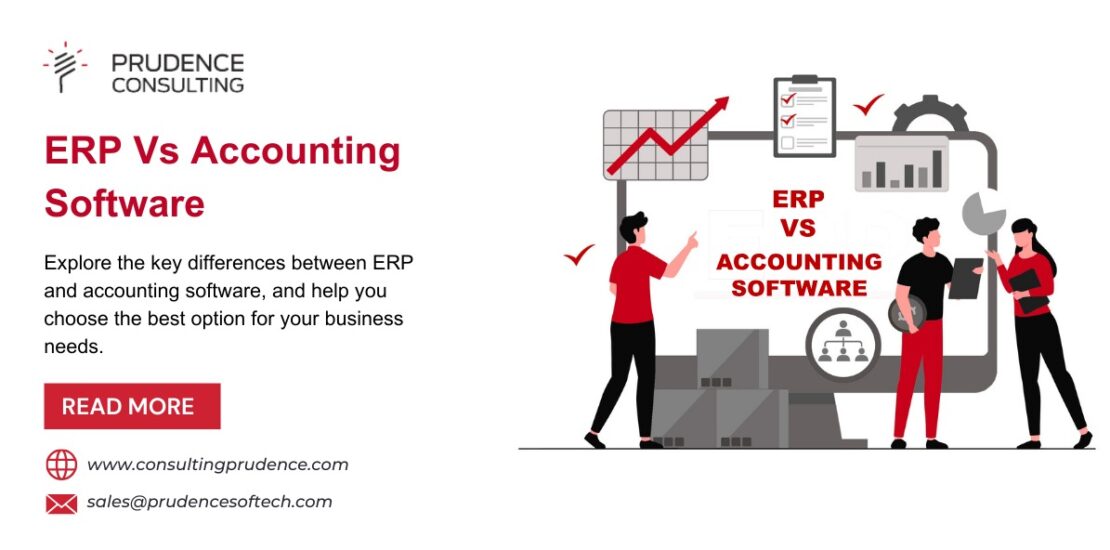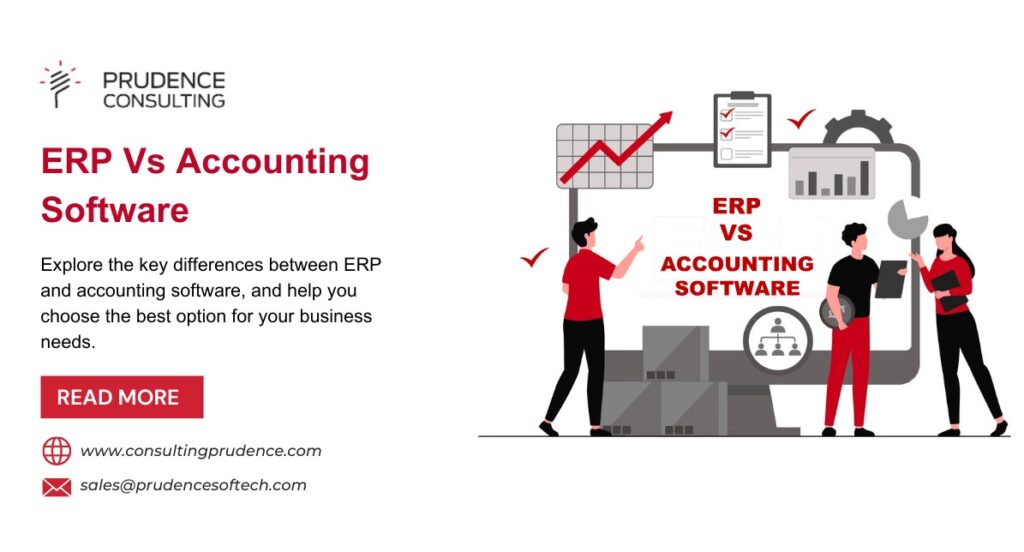Erp vs Accounting Software
-
June 24, 2024
- Posted by: piyush.gupta@prudencesoftech.in
- Category: ERP
No Comments

- June 24, 2024
- Posted by: piyush.gupta@prudencesoftech.in
- Category: ERP


In the fast-paced world of modern business, having the right software to manage your operations is crucial. Two common types of software that businesses often consider are ERP (Enterprise Resource Planning) systems and accounting software. While both serve important functions, they are designed for different purposes and offer distinct advantages. This blog will help you understand the key differences between ERP and accounting software, and guide you in choosing the best option for your business needs.
What is ERP Software?
Definition and Scope
ERP software is a comprehensive suite of integrated applications designed to manage various aspects of a business’s operations. This includes finance, human resources, supply chain, manufacturing, services, procurement, and more. An ERP system provides a centralized platform where all business processes can be streamlined and data can be shared across departments in real time.
Key Features
- Integration: ERP systems integrate all business processes into a single system, facilitating seamless information flow across different departments.
- Automation: By automating repetitive tasks, ERP systems increase efficiency and reduce the likelihood of human error.
- Data Analysis and Reporting: ERP software offers robust data analysis and reporting capabilities, helping businesses make informed decisions.
- Scalability: ERP systems can scale with your business, 9supporting growth and expansion.
Examples of ERP Software
- SAP ERP
- Oracle ERP Cloud
- Microsoft Dynamics 365
- Infor ERP
What is Accounting Software?
Definition and Scope
Accounting software, on the other hand, is a specialized type of software designed specifically for managing a company’s financial transactions and accounting processes. It focuses on functions such as bookkeeping, invoicing, payroll, tax filing, and financial reporting.
Key Features
- Bookkeeping: Automates the recording of financial transactions, ensuring accuracy and consistency.
- Invoicing and Billing: Streamlines the process of creating and sending invoices to customers.
- Payroll Management: Manages employee payroll, including salary calculations, tax withholdings, and direct deposits.
- Tax Management: Helps with tax calculations and filings, ensuring compliance with local regulations.
- Financial Reporting: Generates financial statements and reports, providing insights into the company’s financial health.
Examples of Accounting Software
- QuickBooks
- Xero
- FreshBooks 2
- Sage 50 Cloud
ERP vs. Accounting Software: Key Differences
- Functionality: The primary difference between ERP and accounting software lies in their functionality. While accounting software is focused solely on financial management, ERP systems offer a much broader range of functions. An ERP system includes accounting capabilities but also extends to other areas such as inventory management, customer relationship management (CRM), and human resources.
- Integration: ERP systems are designed to integrate various business processes into one cohesive system, providing a holistic view of the business. Accounting software, while it can integrate with other tools, is typically more siloed and focused on financial data.
- Complexity and Implementation: Implementing an ERP system is generally more complex and time consuming compared to accounting software. ERP systems require significant customization and integration efforts, which can be costly and resource-intensive. On the other hand, accounting software is usually easier to set up and use, making it a better option for small businesses or those with less complex needs.
- Cost: ERP systems tend to be more expensive than accounting software, both in terms of initial implementation and ongoing maintenance. The comprehensive nature of ERP systems means higher costs, whereas accounting software is usually more affordable and offers lower total cost of ownership.
Which One Should You Choose?
- Consider Your Business Needs: The choice between ERP and accounting software depends largely on your business needs. If your primary requirement is to manage financial transactions and generate financial reports, accounting software may be sufficient. However, if you need to integrate various business functions and have a unified system for managing operations, an ERP system would be the better choice.
- Size and Complexity of Your Busines: For small to medium-sized businesses with straightforward financial needs, accounting software is often the best choice due to its simplicity and cost-effectiveness. Larger businesses, or those with complex processes and multiple departments, will benefit more from the comprehensive capabilities of an ERP system.
- Future Growth: Consider your business’s future growth and scalability needs. If you anticipate significant growth or diversification, investing in an ERP system might provide long-term benefits and avoid the need for future software transitions.
Conclusion
Choosing between ERP and accounting software is a critical decision that can impact your business’s efficiency and productivity. By understanding the key differences and considering your specific business needs, you can make an informed choice that supports your operational goals and drives your business forward. Whether you opt for a specialized accounting solution or a comprehensive ERP system, the right software will provide the foundation for better financial management and overall business success.
Also Read : Best ERP for Retail Industry


